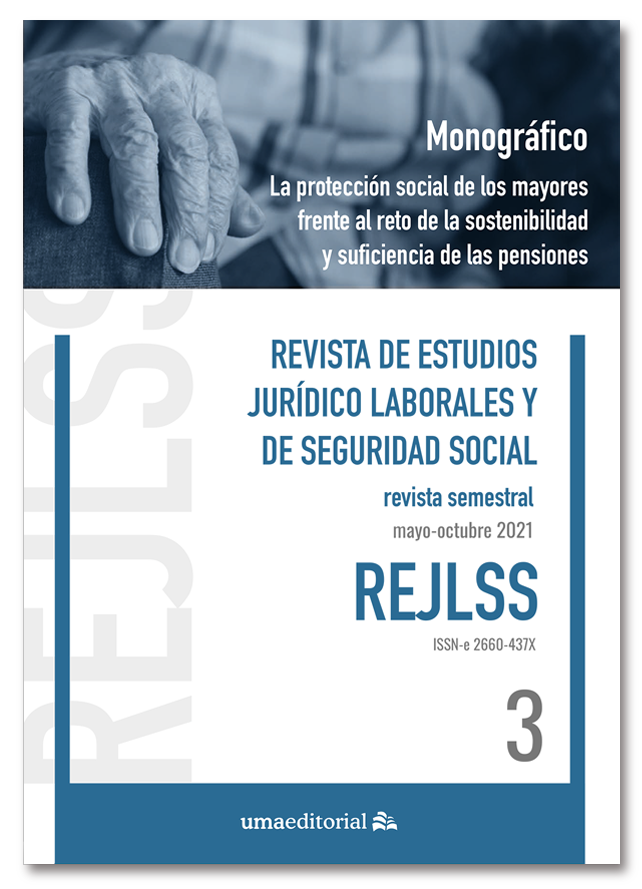The elderly and old-age pensions in Chile
DOI:
https://doi.org/10.24310/rejlss.vi3.13537Keywords:
Social Security, Pensions, Old Age and SolidarityAbstract
As in most nations, the pension is the main benefit (substitute income) to which the elderly have access, a situation that in Chile is put to the test, at least with respect to its sufficiency and comprehensiveness, which, in any case, reaches more than 85% of people aged 65 or older.
Chile currently has a pension system structured on the basis of three pillars: a basic solidarity one, a contributory one complemented with solidarity benefits from the first pillar for a majority sector of the elderly with self-financed pensions, and a third voluntary pillar that seeks to "improve or anticipate" the contributory pensions of mandatory contributions with individual or collective/company savings.
This system has its origins in the structural reform carried out between 1978 and 1980, with its most specific manifestation in Decree Law 3,500 of 1980, complemented, fundamentally in 2008, with the creation of the solidarity pillar.
In addition to the above, there are benefits for the elderly associated with rest and recreation, among others, as well as benefits related to health and illness, in addition to the general ones. We refer to all of them in a descriptive and synthetic way.
The entire study is developed in relation to the so-called four key factors of Social Security: people covered; insured benefits and conditions of access; their financing; and administration and management mechanisms, without neglecting to refer to the role of the State in the overall governance of the system.
Downloads
Metrics
Publication Facts
Reviewer profiles N/A
Author statements
Indexed in
-
—
- Academic society
- N/A
- Publisher
- Universidad de Málaga. UMA Editorial
References
Alvarado García, A. y Salazar Maya, Á., “Análisis del concepto de envejecimiento”, Revista Gerokomos, Vol. 25, N.º 2, Barcelona, 2014.
Arellano Marín, J.P., “Políticas Sociales y Desarrollo: 1924-1984”, CIEPLAN, Santiago, 1985
Barros, C. y otros, La vejez marginada. Situación del anciano en Chile. Instituto de Sociología, Pontificia Universidad Católica de Chile, Santiago, 1979.
Cifuentes Lillo, H., Arellano Ortiz, P. y Walker Errázuriz, F., “Seguridad Social. Parte General y Pensiones”, Editorial Librotecnia, Santiago, 2013.
Cifuentes Lillo, H., “Sistema de Seguridad Social Chileno. Descripción y aspectos generales”, Ediciones UC, Santiago, 2018.
CIEDESS, OISS y Asociación de Cajas, “Servicios Sociales en Chile”, Santiago, 2006
Gálvez, R. y Kremerman, M., Estudio de la Fundación Sol ISSN 0719-6695, “Pensiones por la Fuerza. Resultados del sistema de pensiones de las Fuerzas Armadas y de Orden”, junio 2020. Sitio web: https://media.elmostrador.cl/2020/06/PPF2020.pdf [Revisado el 15.06.2021].
Mesa-Lago, C., “El Desarrollo de la Seguridad Social en América Latina”, CEPAL, Santiago, 1985
Novoa Fuenzalida, P., “Derecho de la Seguridad Social”, Editorial Jurídica de Chile, Santiago, 1977.
OIT, 89º Conferencia. Memorándum: “Un informe elaborado por la Oficina Seguridad social: temas, retos y perspectivas” Informe VI, Conferencia Internacional del Trabajo, 89.a reunión), 2001.
OIT, “Nota resumen. Informe Banco Mundial 1994 “sobre la crisis de la vejez” ("Averting the old age Crisis: Policies to Protect the Old and Promote Growth"). Sitio web: http://white.lim.ilo.org/spanish/260ameri/oitreg/activid/proyectos/actrav/proyectos/
proyecto_ssos/act_subregionales/paises_andinos/documentos/23_26_mayo2011/
notaresumen_informebandomundial.pdf [Revisado el 15.06.2021].
Piñera Echenique, J., “El cascabel al gato”, 1ª Edición, Editorial Zig-Zag, Santiago, 1991.
Downloads
Published
How to Cite
Issue
Section
License
In the Revista de Estudios Juridico Laborales y de Seguridad Social (REJLSS) we are clearly committed to a policy of open access to scientific knowledge (See Berlin Declaration).
Those authors who have publications with this journal accept the following terms:
This journal provides immediate free access to its content under the principle of making research freely available to the public. All the contents published in the REJLSS are subject to the Creative Commons license
Attribution-NonCommercial-NoDerivatives 4.0 International (CC BY-NC-ND 4.0)
Copyrights are of two kinds: moral and patrimonial. Moral rights are perpetual, inalienable, non-transferable, inalienable, unattachable and imprescriptible prerogatives. In accordance with Spanish copyright legislation, the authors who publish in REJLSS retain the moral right over their work, as well as the ownership of the patrimonial right, which will be transferred to the University of Malaga for its dissemination in open access.
The patrimonial rights, refer to the benefits that are obtained by the use or disclosure of the works. REJLSS is published in open access and is exclusively authorized to perform or authorize by any means the use, distribution, dissemination, reproduction, adaptation, translation or transformation of the work.
It is the responsibility of the authors to obtain the necessary permissions of the images that are subject to copyright.
Authors whose contributions are accepted for publication in this journal retain the non-exclusive right to use their contributions for academic, research and educational purposes, including self-archiving or depositing in open access repositories of any kind.
The electronic edition of this magazine is edited by the Editorial of the University of Malaga (UmaEditorial), being necessary to cite the origin in any partial or total reproduction.
The authors may adopt other non-exclusive license agreements for the distribution of the version of the published work (eg: deposit it in an institutional telematic archive or publish it in a monographic volume) provided that the initial publication is indicated in this magazine.
Authors are allowed and recommended to disseminate their work through the Internet (eg, in institutional telematic archives or on their website) before and during the submission process, which can produce interesting exchanges and increase citations of the published work.







19.png)
